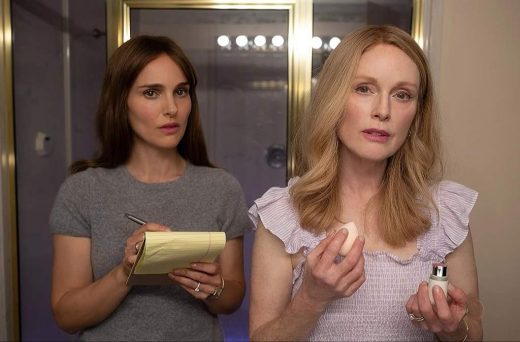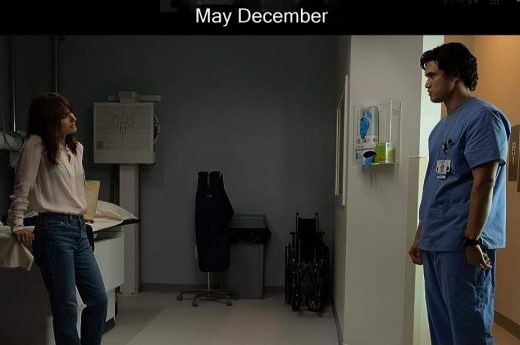In Todd Haynes’s latest movie May December, Natalie Portman is an actress studying the real-life model for her character, (Julianne Moore), a woman with a tabloid back story.
May December movie review. Much of Todd Haynes’s sly, unnerving “May December” takes place in and around a picture-perfect home, that favorite movieland setting for American dreams turned nightmares.
This one comes wrapped in a dappled, hazy light that blunts hard lines and brightens every face, so much so that characters sometimes look lit from within. Even the evening has an inviting velvetiness, as if all of life’s shadows have been banished. In characteristic Haynes fashion, though, nothing is as it first seems in this shimmering Gothic, including the light that becomes more like a queasy, suffocating miasma.
“May December” is the story of two women and their worlds of lies. They meet when a TV actress, Elizabeth (Natalie Portman), visits Gracie (Julianne Moore), the inspiration for her next role. Gracie lives in a large waterfront house in Savannah with her husband, Joe (Charles Melton), their teenage twins and two Irish setters. They have another kid in college, jobs they seem to enjoy and a complicated history that’s summed up by the box Elizabeth finds at their front door, and which Gracie opens with a shrug of familiarity. It’s feces, she explains coolly, and this isn’t the first such package.
That box is a blunt metaphor for the ugliness at the core of “May December” — years ago, Gracie became tabloid fodder after she was caught having sex with Joe when he was in seventh grade — a setup that Haynes brilliantly complicates with his three knockout leads, great narrative dexterity and shocks of destabilizing humor that ease you into the story. The first time I watched the movie, I almost clapped my hand over my mouth during one absurd moment, unsure if I was supposed to be laughing this hard. Of course I was: Haynes is having fun, at least for a while, partly to play with our expectations about where the movie is headed.
A progenitor of the New Queer Cinema movement of the early 1990s, Haynes likes to dig into that space between the world that exists (or we believe exists) and the world of appearances. He’s a virtuoso of paradoxes. That partly explains why he’s drawn to the woman’s film, with its focus on ordinary life, its domestic spaces, moral quandaries, political dimensions and tears. These films evoke what the critic Molly Haskell once described as “wet, wasted afternoons” and reveal what lies “beneath the sunny-side-up philosophy congealed in the happy ending.” She might as well have been talking about this movie.
Written by Samy Burch — it’s her first produced screenplay — “May December” is a woman’s picture in a distinctly Haynesian key. As he has in some of his earlier films (“Far From Heaven,” “Carol”), Haynes at once embraces and toys with genre conventions. He uses beautiful images (and people), bursts of lush music, pointed metaphors and floods of feeling to provide the familiar pleasures of a well-told, absorbing narrative film, even as he picks it apart at the seams. This can create an uneasy dissonance, and there are instances when it seems as if you’re watching two overlaid movies: the original and its critique, a doubling that works nicely in “May December,” which soon becomes a labyrinthine hall of mirrors.
Gracie’s character is loosely based on Mary Kay Letourneau, a teacher who in 1997 was arrested for having sex with one of her sixth-grade students, abuse that started when he was 12. She pleaded guilty to child rape and eventually served time in prison, where she gave birth to their first two children. (They later married.) The case generated a predictable tsunami of grotesque media slavering and found putatively serious journalists referring (and continuing to refer) to the sexual assault as a “tryst” and “forbidden love,” language that prettied up the crime as a passionate romance.
Gracie rationalizes her relationship with Joe on her own terms, which emerge as Elizabeth gathers intel. As Elizabeth plays detective — she scans old tabloids, interviews family and friends — she helpfully establishes the back story. Gracie isn’t a teacher, and she and Joe met in a pet store, a seemingly incidental detail that takes on poignantly metaphoric resonance as the story unfolds. At one point, Elizabeth also accompanies Gracie and her daughter Mary (Elizabeth Yu) on a shopping trip. When the girl tries on a sleeveless dress, Gracie tells Mary she’s “brave” for baring her arms and not caring about “unrealistic beauty standards.” Mary looks crushed, Gracie oblivious and Elizabeth a bit stunned but oh-so fascinated.
At this stage in her process, Elizabeth has begun to imitate Gracie’s gestures and expressions, a turn that Haynes expresses in the tricky shot that opens the shopping scene. As Mary tries on dresses, the women sit side-by-side facing the camera, two mirrors flanking them like drawn curtains. Because of the angles of the mirror, Elizabeth looks as if she’s seated between Gracie and Gracie’s reflection. It takes a beat to read the image and figure out why there are two Gracies, although as Elizabeth slips into character, suddenly there are three.
Moore and Portman’s synced performances give the movie much of its weird comedy. Elizabeth guides you into the story, and you’re tagging along when she pulls up to her Savannah digs and later to Gracie and Joe’s home. Portman gives Elizabeth the studied agreeability of someone who has to work to present a friendly front, an effort that will be familiar to anyone who’s ever interviewed a bored film star. Elizabeth is quick to smile, but Portman shows you the character’s brittle affect, so that you see the flickers of hesitation in her eyes and twitches around her mouth. Mostly, you see that Elizabeth isn’t a very good actress. (Presumably that’s why when she tries out Gracie’s lisping voice, she evokes Madeline Kahn.)
Gracie doesn’t need to put up a false front because her existence is nothing but a fully committed, melodramatically rich performance that Moore supplely delivers with alternating eerie calm and impressive histrionic mewling and caterwauling. Gracie has embraced her roles as a loving wife and doting mother, and seems to be living in a profound state of denial about what these roles have cost her husband and children, a lack of understanding (and remorse) that establishes the story’s inaugural moral crisis. It’s not at all clear, at first, if Gracie is lying to herself, blissfully self-unaware or just another garden-variety sociopath playing at the American dream, uncertainty that gives the story a frisson of mystery.
Gracie and Elizabeth dominate the first half of “May December.” Then, almost imperceptibly, the focus shifts to Joe, and the story grows ever more serious, heavy and very, very sad. Moore and Portman are tremendous, but it’s Melton’s anguished performance that gives the movie its slow-building emotional power. A stunted man-child with a hulking, ponderous body, Joe too has multiple roles as a father and husband, an object of desire and exoticized other. Yet none fit as persuasively, and he’s most at ease in the scenes of him with the Monarch butterflies he raises in little cages. It’s a sweet pastime and a potentially blunt metaphor, one that Haynes handles with enormous, moving delicacy, never more so than when these beautiful creatures emerge from their chrysalises and Joe tenderly watches them take flight.
May December (2023)
Directed by: Todd Haynes
Starring: Natalie Portman, Julianne Moore, Charles Melton, D.W. Moffet, Piper Curda, Elizabeth Yu, Gabriel Chung, Cory Michael, Lawrence Arancio, Andrea Frankle, Hailey Wist
Screenplay by: Samy Burch
Production Design by: Sam Lisenco
Cinematography by: Christopher Blauvelt
Film Editing by: Affonso Gonçalves
Costume Design by: April Napier
Set Decoration by: Jess Royal
Art Direction by: Eric Dean
Music by: Marcelo Zarvos
MPAA Rating: R for some sexual content, graphic nudity, drug use and language.
Distributed by: Netflix
Release Date: May 20, 2023 (Cannes), November 17, 2023 (United States)
Visits: 165






